Student motivations to study abroad – an empirical study of vietnamese students in UK
ABSTRACT
This study adapts Push and Pull Theory in educational tourism to explore and measure factors that make
students studying abroad in addition to considering travel behaviours of them while being in UK. By using the
survey data from 125 Vietnamese students currently studying in United Kingdom. Vietnamese students decide to
study abroad to get a better education than domestic one, improve job prospects as well as have a better
understanding of western countries’ culture. Quality of the course and university is also considered when making
decision. Besides, pull factor related to destination is the last factor affect students’ motivations. When Vietnamese
students study at the host country, they seem to travel frequently and stay longer per trip. Vietnamese students also
prefer hotel/motel than youth hostel in terms of accommodation.
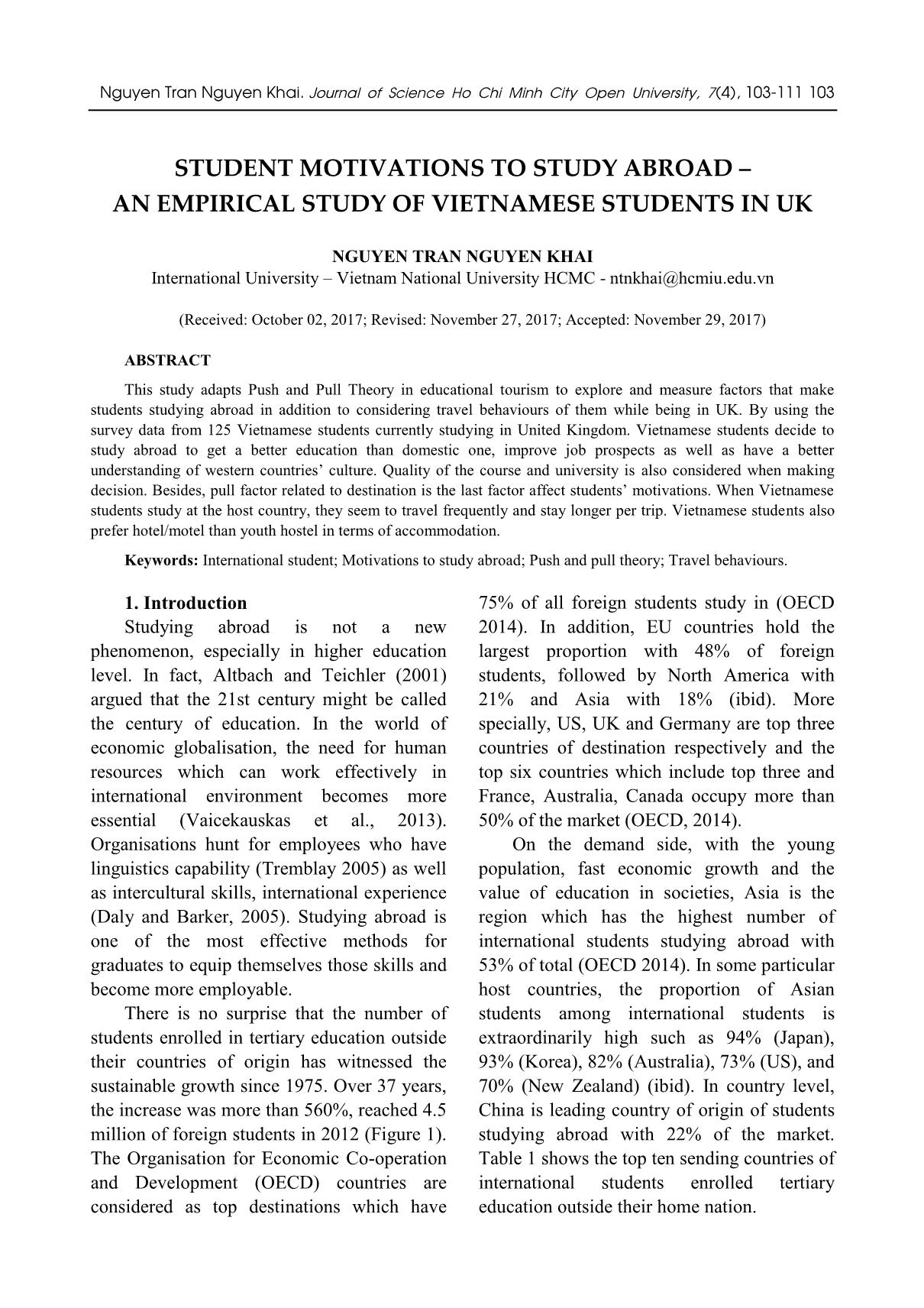
Trang 1
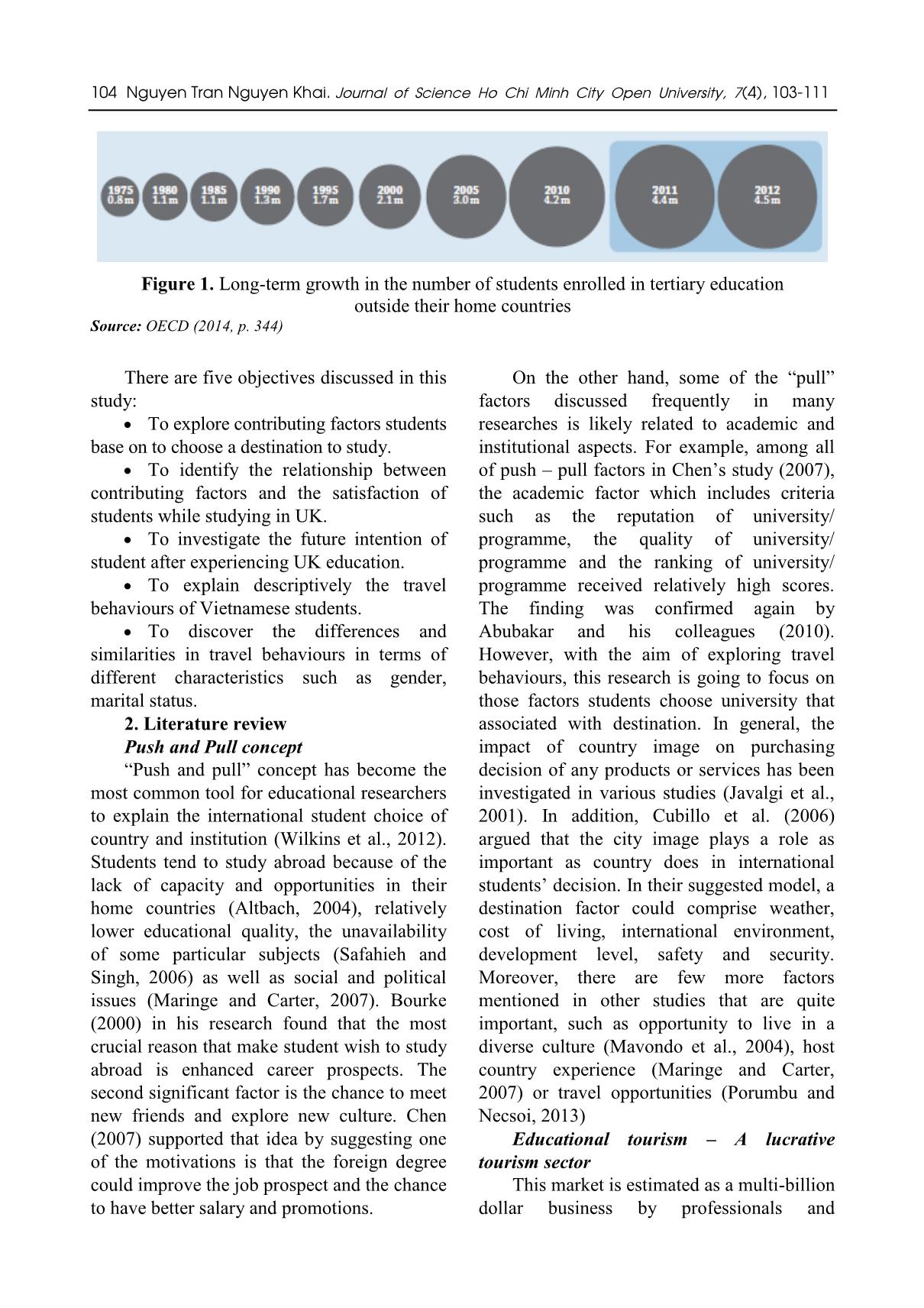
Trang 2
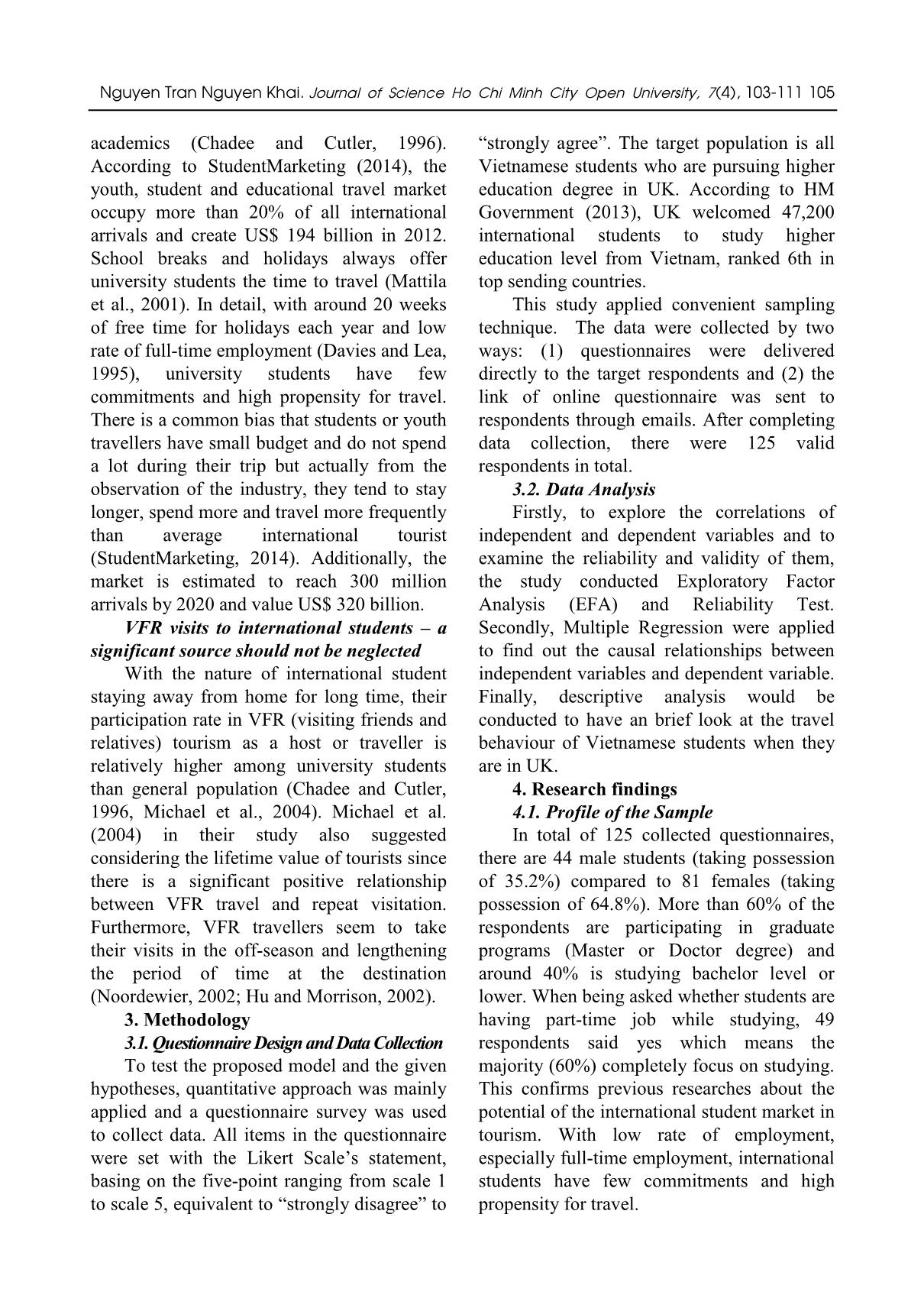
Trang 3
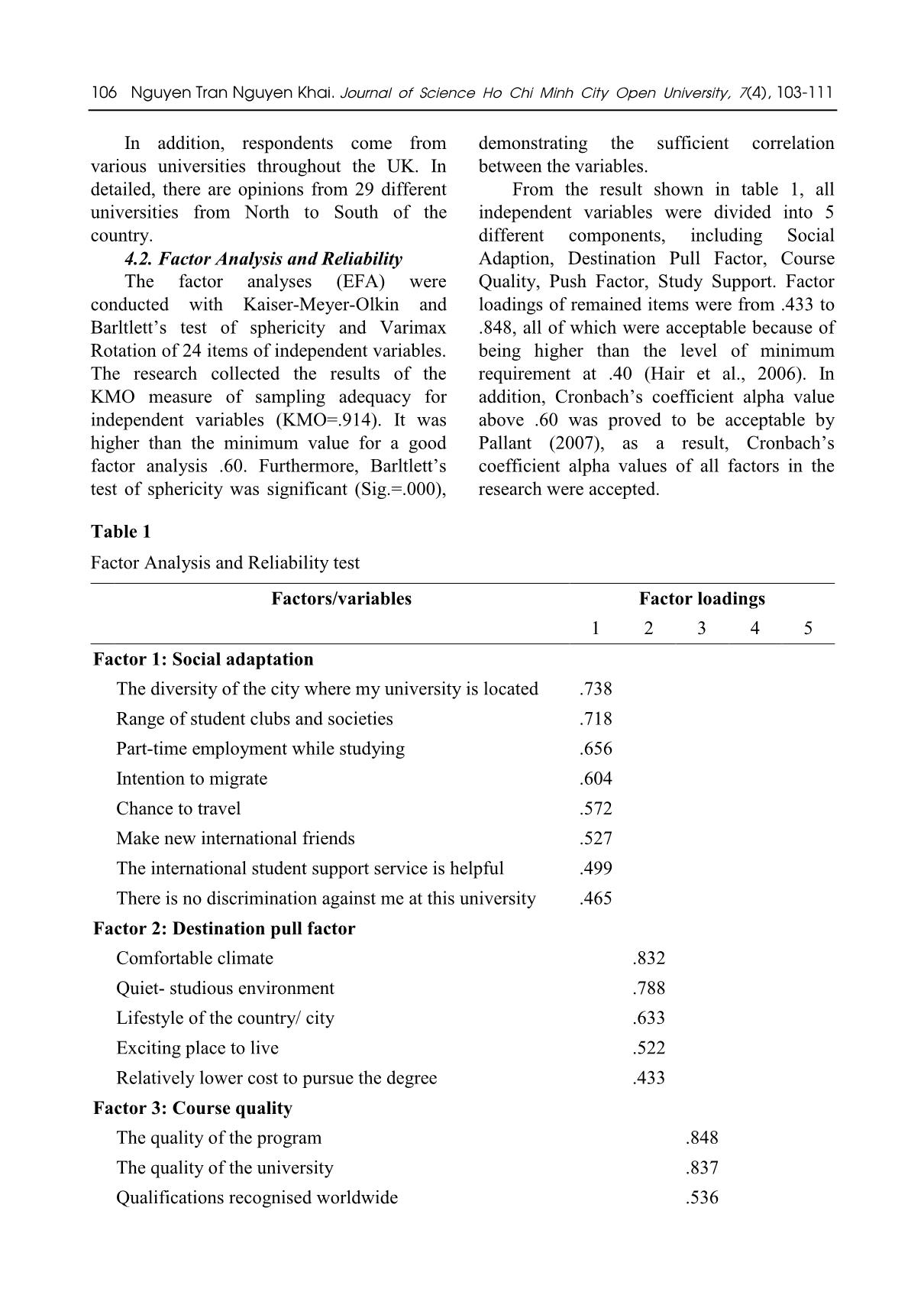
Trang 4
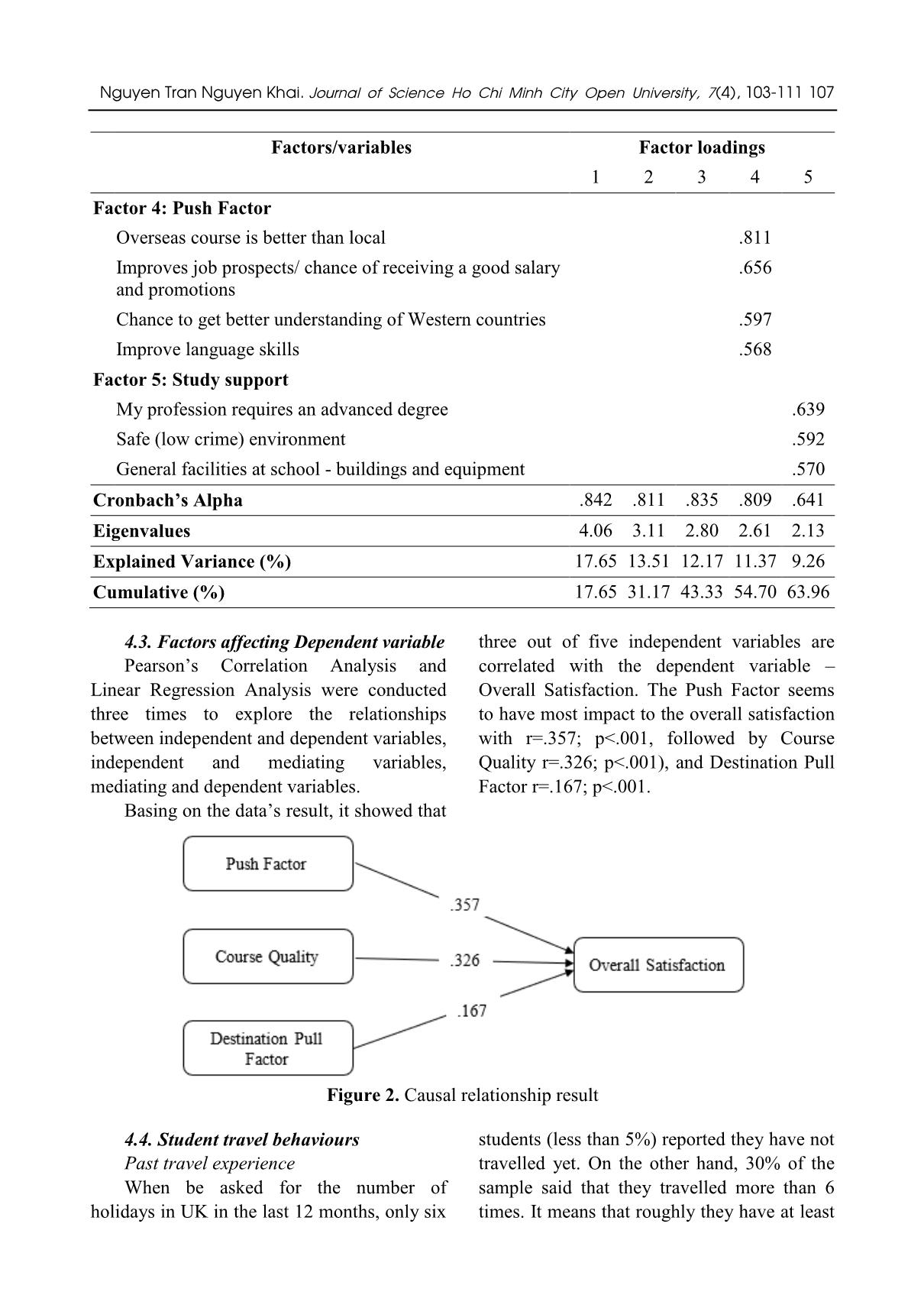
Trang 5
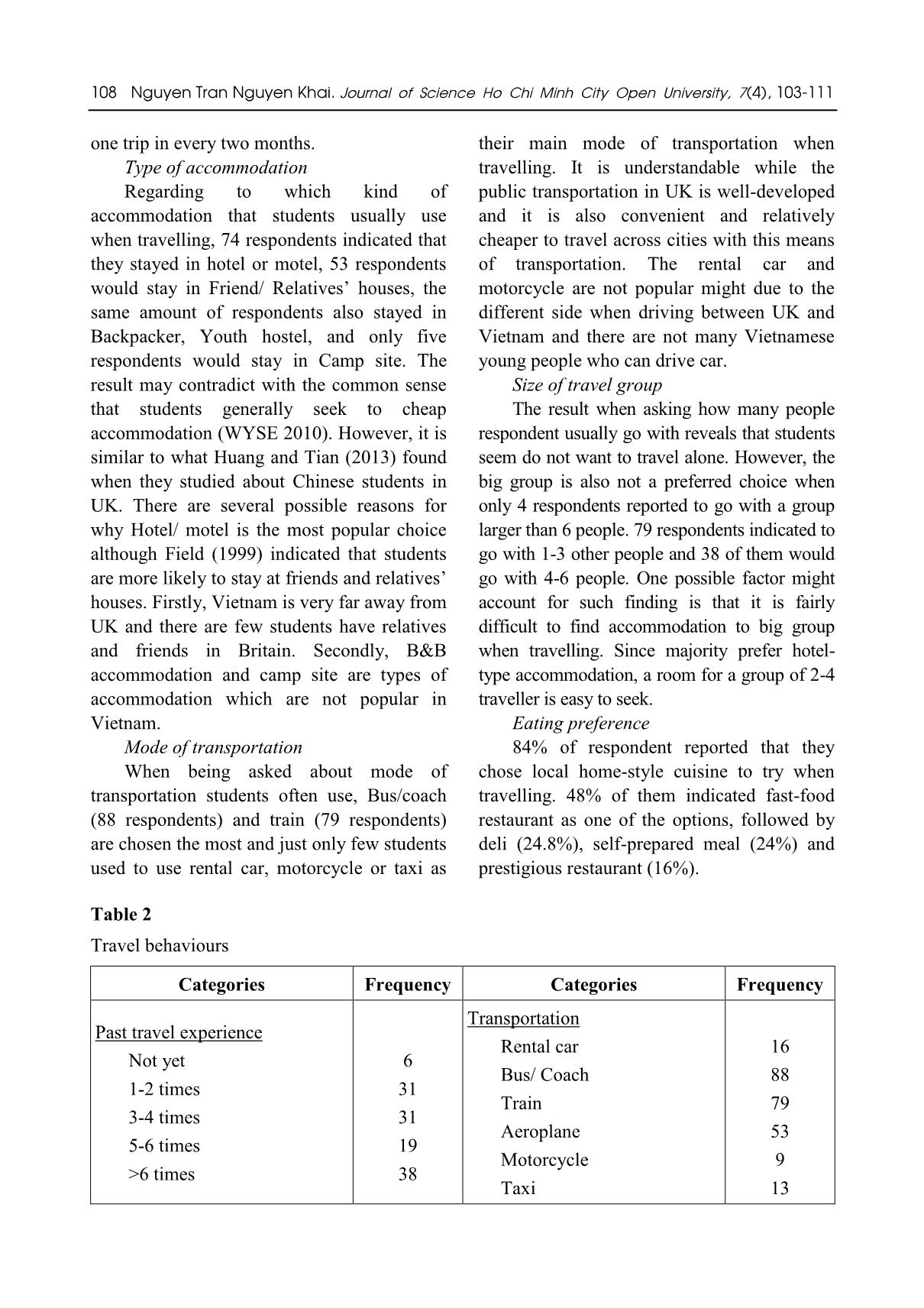
Trang 6
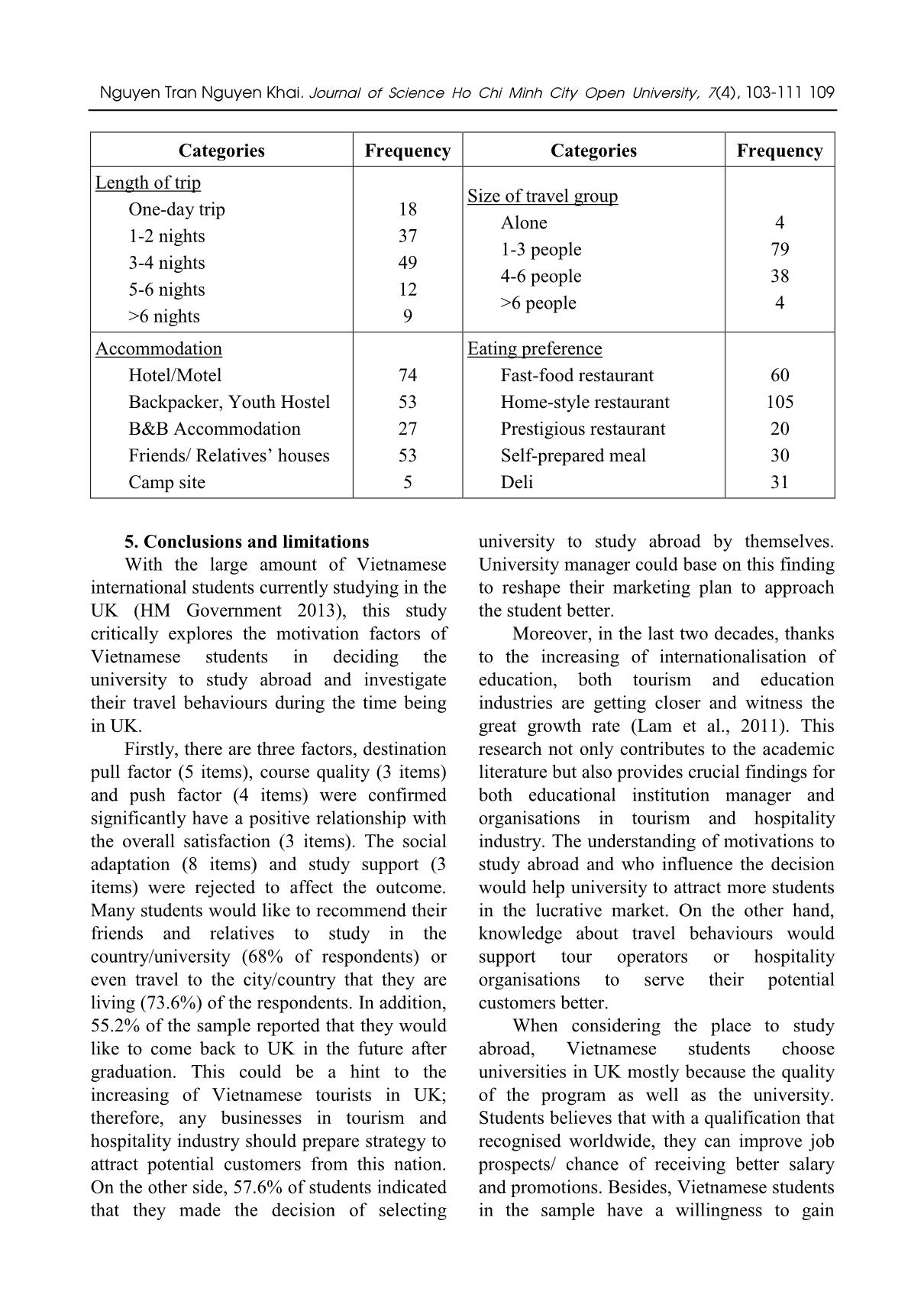
Trang 7
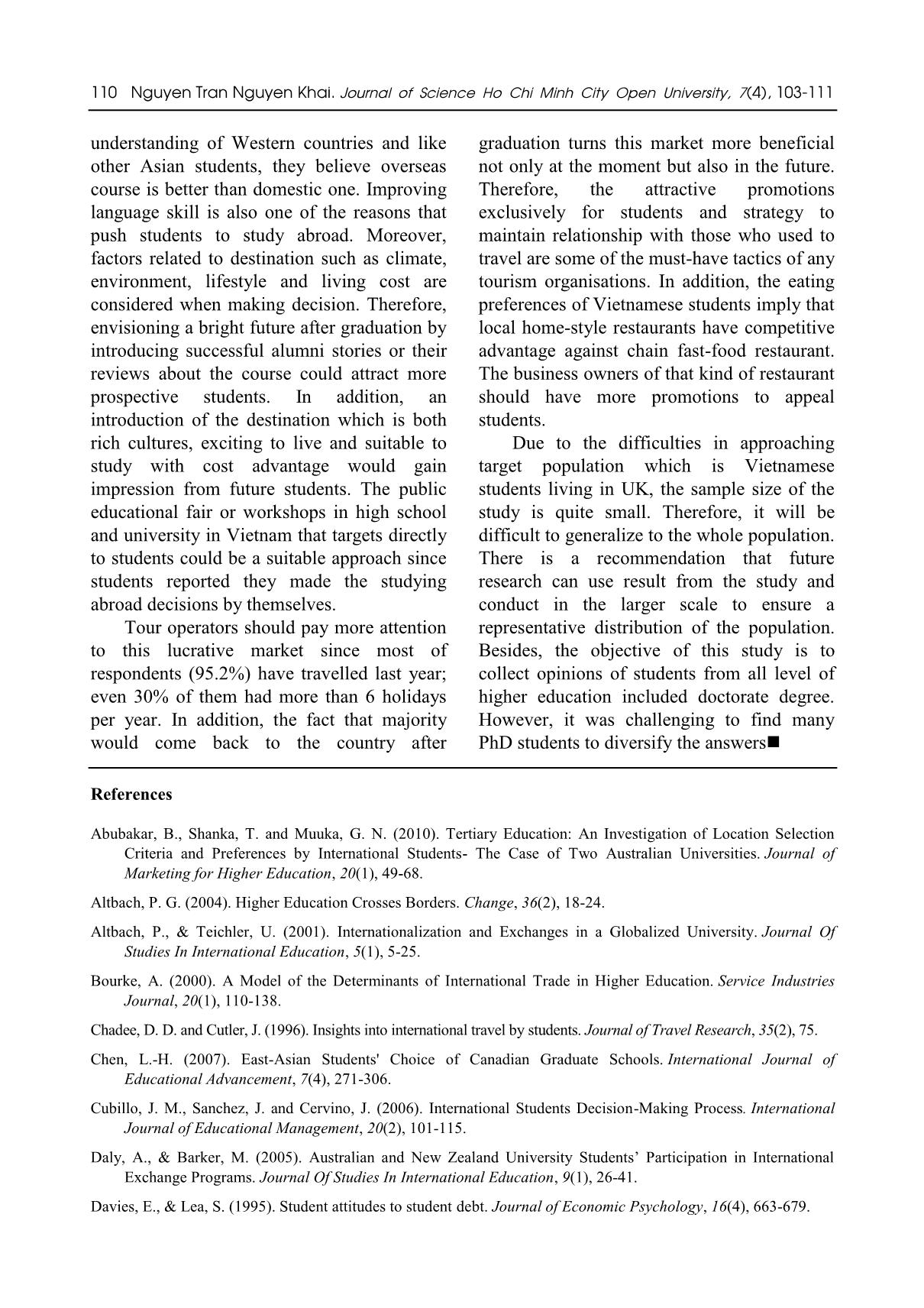
Trang 8
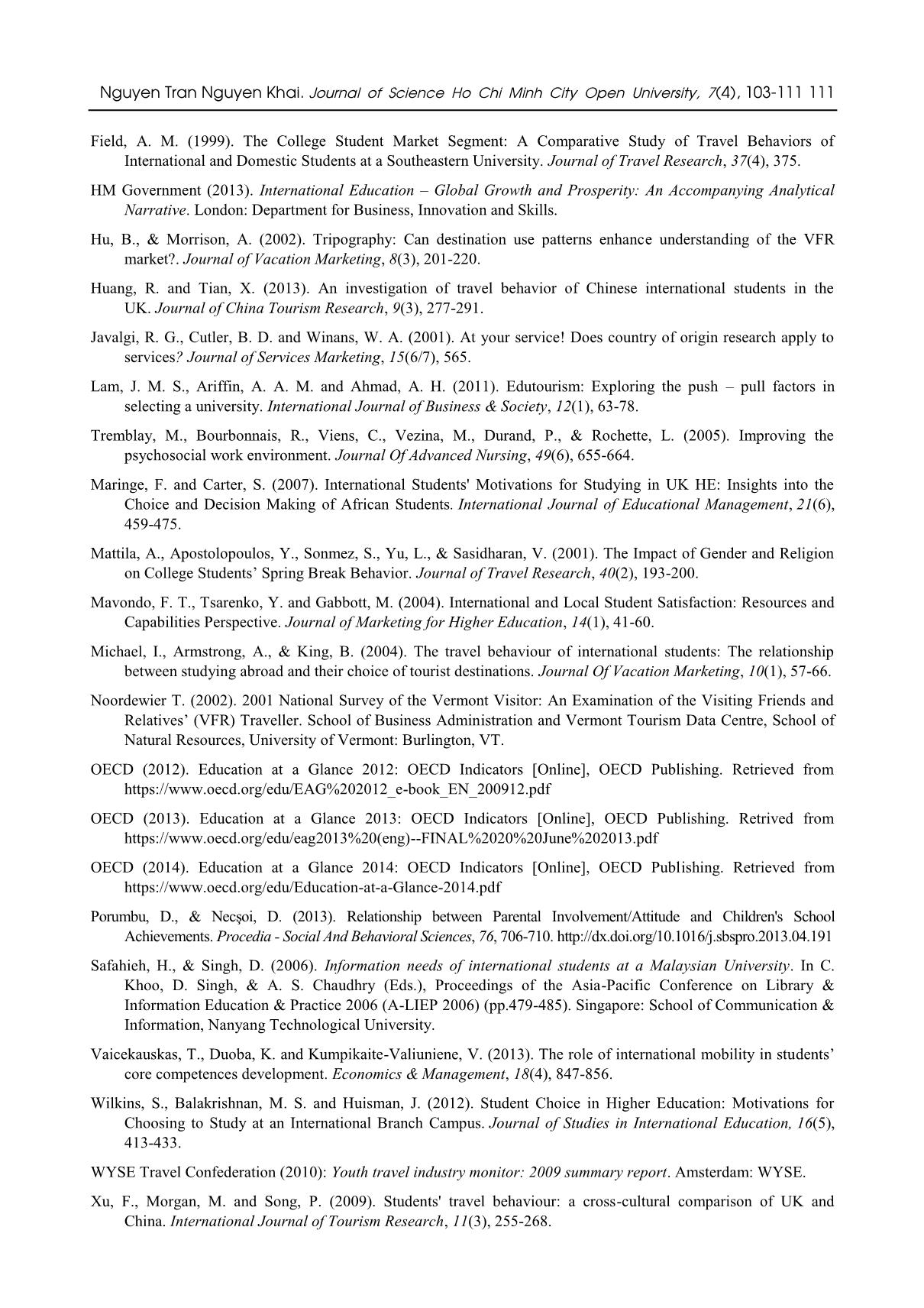
Trang 9
Tóm tắt nội dung tài liệu: Student motivations to study abroad – an empirical study of vietnamese students in UK
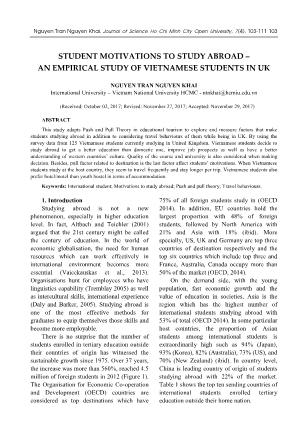
Nguyen Tran Nguyen Khai. Journal of Science Ho Chi Minh City Open University, 7(4), 103-111 103 STUDENT MOTIVATIONS TO STUDY ABROAD – AN EMPIRICAL STUDY OF VIETNAMESE STUDENTS IN UK NGUYEN TRAN NGUYEN KHAI International University – Vietnam National University HCMC - ntnkhai@hcmiu.edu.vn (Received: October 02, 2017; Revised: November 27, 2017; Accepted: November 29, 2017) ABSTRACT This study adapts Push and Pull Theory in educational tourism to explore and measure factors that make students studying abroad in addition to considering travel behaviours of them while being in UK. By using the survey data from 125 Vietnamese students currently studying in United Kingdom. Vietnamese students decide to study abroad to get a better education than domestic one, improve job prospects as well as have a better understanding of western countries’ culture. Quality of the course and university is also considered when making decision. Besides, pull factor related to destination is the last factor affect students’ motivations. When Vietnamese students study at the host country, they seem to travel frequently and stay longer per trip. Vietnamese students also prefer hotel/motel than youth hostel in terms of accommodation. Keywords: International student; Motivations to study abroad; Push and pull theory; Travel behaviours. 1. Introduction Studying abroad is not a new phenomenon, especially in higher education level. In fact, Altbach and Teichler (2001) argued that the 21st century might be called the century of education. In the world of economic globalisation, the need for human resources which can work effectively in international environment becomes more essential (Vaicekauskas et al., 2013). Organisations hunt for employees who have linguistics capability (Tremblay 2005) as well as intercultural skills, international experience (Daly and Barker, 2005). Studying abroad is one of the most effective methods for graduates to equip themselves those skills and become more employable. There is no surprise that the number of students enrolled in tertiary education outside their countries of origin has witnessed the sustainable growth since 1975. Over 37 years, the increase was more than 560%, reached 4.5 million of foreign students in 2012 (Figure 1). The Organisation for Economic Co-operation and Development (OECD) countries are considered as top destinations which have 75% of all foreign students study in (OECD 2014). In addition, EU countries hold the largest proportion with 48% of foreign students, followed by North America with 21% and Asia with 18% (ibid). More specially, US, UK and Germany are top three countries of destination respectively and the top six countries which include top three and France, Australia, Canada occupy more than 50% of the market (OECD, 2014). On the demand side, with the young population, fast economic growth and the value of education in societies, Asia is the region which has the highest number of international students studying abroad with 53% of total (OECD 2014). In some particular host countries, the proportion of Asian students among international students is extraordinarily high such as 94% (Japan), 93% (Korea), 82% (Australia), 73% (US), and 70% (New Zealand) (ibid). In country level, China is leading country of origin of students studying abroad with 22% of the market. Table 1 shows the top ten sending countries of international students enrolled tertiary education outside their home nation. 104 Nguyen Tran Nguyen Khai. Journal of Science Ho Chi Minh City Open University, 7(4), 103-111 Figure 1. Long-term growth in the number of students enrolled in tertiary education outside their home countries Source: OECD (2014, p. 344) There are five objectives discussed in this study: To explore contributing factors students base on to choose a destination to study. To identify the relationship between contributing factors and the satisfaction of students while studying in UK. To investigate the future intention of student after experiencing UK education. To explain descriptively the travel behaviours of Vietnamese students. To discover the differences and similarities in travel behaviours in terms of different characteristics such as gender, marital status. 2. Literature review Push and Pull concept “Push and pull” concept has become the most common tool for educational researchers to explain the international student choice of country and institution (Wilkins et al., 2012). Students tend to study abroad because of the lack of capacity and opportunities in their home countries (Altbach, 2004), relatively lower educational quality, the unavailability of some particular subjects (Safahieh and Singh, 2006) as well as social and political issues (Maringe and Carter, 2007). Bourke (2000) in his rese ... verall satisfaction with r=.357; p<.001, followed by Course Quality r=.326; p<.001), and Destination Pull Factor r=.167; p<.001. Figure 2. Causal relationship result 4.4. Student travel behaviours Past travel experience When be asked for the number of holidays in UK in the last 12 months, only six students (less than 5%) reported they have not travelled yet. On the other hand, 30% of the sample said that they travelled more than 6 times. It means that roughly they have at least 108 Nguyen Tran Nguyen Khai. Journal of Science Ho Chi Minh City Open University, 7(4), 103-111 one trip in every two months. Type of accommodation Regarding to which kind of accommodation that students usually use when travelling, 74 respondents indicated that they stayed in hotel or motel, 53 respondents would stay in Friend/ Relatives’ houses, the same amount of respondents also stayed in Backpacker, Youth hostel, and only five respondents would stay in Camp site. The result may contradict with the common sense that students generally seek to cheap accommodation (WYSE 2010). However, it is similar to what Huang and Tian (2013) found when they studied about Chinese students in UK. There are several possible reasons for why Hotel/ motel is the most popular choice although Field (1999) indicated that students are more likely to stay at friends and relatives’ houses. Firstly, Vietnam is very far away from UK and there are few students have relatives and friends in Britain. Secondly, B&B accommodation and camp site are types of accommodation which are not popular in Vietnam. Mode of transportation When being asked about mode of transportation students often use, Bus/coach (88 respondents) and train (79 respondents) are chosen the most and just only few students used to use rental car, motorcycle or taxi as their main mode of transportation when travelling. It is understandable while the public transportation in UK is well-developed and it is also convenient and relatively cheaper to travel across cities with this means of transportation. The rental car and motorcycle are not popular might due to the different side when driving between UK and Vietnam and there are not many Vietnamese young people who can drive car. Size of travel group The result when asking how many people respondent usually go with reveals that students seem do not want to travel alone. However, the big group is also not a preferred choice when only 4 respondents reported to go with a group larger than 6 people. 79 respondents indicated to go with 1-3 other people and 38 of them would go with 4-6 people. One possible factor might account for such finding is that it is fairly difficult to find accommodation to big group when travelling. Since majority prefer hotel- type accommodation, a room for a group of 2-4 traveller is easy to seek. Eating preference 84% of respondent reported that they chose local home-style cuisine to try when travelling. 48% of them indicated fast-food restaurant as one of the options, followed by deli (24.8%), self-prepared meal (24%) and prestigious restaurant (16%). Table 2 Travel behaviours Categories Frequency Categories Frequency Past travel experience Not yet 1-2 times 3-4 times 5-6 times >6 times 6 31 31 19 38 Transportation Rental car Bus/ Coach Train Aeroplane Motorcycle Taxi 16 88 79 53 9 13 Nguyen Tran Nguyen Khai. Journal of Science Ho Chi Minh City Open University, 7(4), 103-111 109 Categories Frequency Categories Frequency Length of trip One-day trip 1-2 nights 3-4 nights 5-6 nights >6 nights 18 37 49 12 9 Size of travel group Alone 1-3 people 4-6 people >6 people 4 79 38 4 Accommodation Hotel/Motel Backpacker, Youth Hostel B&B Accommodation Friends/ Relatives’ houses Camp site 74 53 27 53 5 Eating preference Fast-food restaurant Home-style restaurant Prestigious restaurant Self-prepared meal Deli 60 105 20 30 31 5. Conclusions and limitations With the large amount of Vietnamese international students currently studying in the UK (HM Government 2013), this study critically explores the motivation factors of Vietnamese students in deciding the university to study abroad and investigate their travel behaviours during the time being in UK. Firstly, there are three factors, destination pull factor (5 items), course quality (3 items) and push factor (4 items) were confirmed significantly have a positive relationship with the overall satisfaction (3 items). The social adaptation (8 items) and study support (3 items) were rejected to affect the outcome. Many students would like to recommend their friends and relatives to study in the country/university (68% of respondents) or even travel to the city/country that they are living (73.6%) of the respondents. In addition, 55.2% of the sample reported that they would like to come back to UK in the future after graduation. This could be a hint to the increasing of Vietnamese tourists in UK; therefore, any businesses in tourism and hospitality industry should prepare strategy to attract potential customers from this nation. On the other side, 57.6% of students indicated that they made the decision of selecting university to study abroad by themselves. University manager could base on this finding to reshape their marketing plan to approach the student better. Moreover, in the last two decades, thanks to the increasing of internationalisation of education, both tourism and education industries are getting closer and witness the great growth rate (Lam et al., 2011). This research not only contributes to the academic literature but also provides crucial findings for both educational institution manager and organisations in tourism and hospitality industry. The understanding of motivations to study abroad and who influence the decision would help university to attract more students in the lucrative market. On the other hand, knowledge about travel behaviours would support tour operators or hospitality organisations to serve their potential customers better. When considering the place to study abroad, Vietnamese students choose universities in UK mostly because the quality of the program as well as the university. Students believes that with a qualification that recognised worldwide, they can improve job prospects/ chance of receiving better salary and promotions. Besides, Vietnamese students in the sample have a willingness to gain 110 Nguyen Tran Nguyen Khai. Journal of Science Ho Chi Minh City Open University, 7(4), 103-111 understanding of Western countries and like other Asian students, they believe overseas course is better than domestic one. Improving language skill is also one of the reasons that push students to study abroad. Moreover, factors related to destination such as climate, environment, lifestyle and living cost are considered when making decision. Therefore, envisioning a bright future after graduation by introducing successful alumni stories or their reviews about the course could attract more prospective students. In addition, an introduction of the destination which is both rich cultures, exciting to live and suitable to study with cost advantage would gain impression from future students. The public educational fair or workshops in high school and university in Vietnam that targets directly to students could be a suitable approach since students reported they made the studying abroad decisions by themselves. Tour operators should pay more attention to this lucrative market since most of respondents (95.2%) have travelled last year; even 30% of them had more than 6 holidays per year. In addition, the fact that majority would come back to the country after graduation turns this market more beneficial not only at the moment but also in the future. Therefore, the attractive promotions exclusively for students and strategy to maintain relationship with those who used to travel are some of the must-have tactics of any tourism organisations. In addition, the eating preferences of Vietnamese students imply that local home-style restaurants have competitive advantage against chain fast-food restaurant. The business owners of that kind of restaurant should have more promotions to appeal students. Due to the difficulties in approaching target population which is Vietnamese students living in UK, the sample size of the study is quite small. Therefore, it will be difficult to generalize to the whole population. There is a recommendation that future research can use result from the study and conduct in the larger scale to ensure a representative distribution of the population. Besides, the objective of this study is to collect opinions of students from all level of higher education included doctorate degree. However, it was challenging to find many PhD students to diversify the answers References Abubakar, B., Shanka, T. and Muuka, G. N. (2010). Tertiary Education: An Investigation of Location Selection Criteria and Preferences by International Students- The Case of Two Australian Universities. Journal of Marketing for Higher Education, 20(1), 49-68. Altbach, P. G. (2004). Higher Education Crosses Borders. Change, 36(2), 18-24. Altbach, P., & Teichler, U. (2001). Internationalization and Exchanges in a Globalized University. Journal Of Studies In International Education, 5(1), 5-25. Bourke, A. (2000). A Model of the Determinants of International Trade in Higher Education. Service Industries Journal, 20(1), 110-138. Chadee, D. D. and Cutler, J. (1996). Insights into international travel by students. Journal of Travel Research, 35(2), 75. Chen, L.-H. (2007). East-Asian Students' Choice of Canadian Graduate Schools. International Journal of Educational Advancement, 7(4), 271-306. Cubillo, J. M., Sanchez, J. and Cervino, J. (2006). International Students Decision-Making Process. International Journal of Educational Management, 20(2), 101-115. Daly, A., & Barker, M. (2005). Australian and New Zealand University Students’ Participation in International Exchange Programs. Journal Of Studies In International Education, 9(1), 26-41. Davies, E., & Lea, S. (1995). Student attitudes to student debt. Journal of Economic Psychology, 16(4), 663-679. Nguyen Tran Nguyen Khai. Journal of Science Ho Chi Minh City Open University, 7(4), 103-111 111 Field, A. M. (1999). The College Student Market Segment: A Comparative Study of Travel Behaviors of International and Domestic Students at a Southeastern University. Journal of Travel Research, 37(4), 375. HM Government (2013). International Education – Global Growth and Prosperity: An Accompanying Analytical Narrative. London: Department for Business, Innovation and Skills. Hu, B., & Morrison, A. (2002). Tripography: Can destination use patterns enhance understanding of the VFR market?. Journal of Vacation Marketing, 8(3), 201-220. Huang, R. and Tian, X. (2013). An investigation of travel behavior of Chinese international students in the UK. Journal of China Tourism Research, 9(3), 277-291. Javalgi, R. G., Cutler, B. D. and Winans, W. A. (2001). At your service! Does country of origin research apply to services? Journal of Services Marketing, 15(6/7), 565. Lam, J. M. S., Ariffin, A. A. M. and Ahmad, A. H. (2011). Edutourism: Exploring the push – pull factors in selecting a university. International Journal of Business & Society, 12(1), 63-78. Tremblay, M., Bourbonnais, R., Viens, C., Vezina, M., Durand, P., & Rochette, L. (2005). Improving the psychosocial work environment. Journal Of Advanced Nursing, 49(6), 655-664. Maringe, F. and Carter, S. (2007). International Students' Motivations for Studying in UK HE: Insights into the Choice and Decision Making of African Students. International Journal of Educational Management, 21(6), 459-475. Mattila, A., Apostolopoulos, Y., Sonmez, S., Yu, L., & Sasidharan, V. (2001). The Impact of Gender and Religion on College Students’ Spring Break Behavior. Journal of Travel Research, 40(2), 193-200. Mavondo, F. T., Tsarenko, Y. and Gabbott, M. (2004). International and Local Student Satisfaction: Resources and Capabilities Perspective. Journal of Marketing for Higher Education, 14(1), 41-60. Michael, I., Armstrong, A., & King, B. (2004). The travel behaviour of international students: The relationship between studying abroad and their choice of tourist destinations. Journal Of Vacation Marketing, 10(1), 57-66. Noordewier T. (2002). 2001 National Survey of the Vermont Visitor: An Examination of the Visiting Friends and Relatives’ (VFR) Traveller. School of Business Administration and Vermont Tourism Data Centre, School of Natural Resources, University of Vermont: Burlington, VT. OECD (2012). Education at a Glance 2012: OECD Indicators [Online], OECD Publishing. Retrieved from https://www.oecd.org/edu/EAG%202012_e-book_EN_200912.pdf OECD (2013). Education at a Glance 2013: OECD Indicators [Online], OECD Publishing. Retrived from https://www.oecd.org/edu/eag2013%20(eng)--FINAL%2020%20June%202013.pdf OECD (2014). Education at a Glance 2014: OECD Indicators [Online], OECD Publishing. Retrieved from https://www.oecd.org/edu/Education-at-a-Glance-2014.pdf Porumbu, D., & Necşoi, D. (2013). Relationship between Parental Involvement/Attitude and Children's School Achievements. Procedia - Social And Behavioral Sciences, 76, 706-710. Safahieh, H., & Singh, D. (2006). Information needs of international students at a Malaysian University. In C. Khoo, D. Singh, & A. S. Chaudhry (Eds.), Proceedings of the Asia-Pacific Conference on Library & Information Education & Practice 2006 (A-LIEP 2006) (pp.479-485). Singapore: School of Communication & Information, Nanyang Technological University. Vaicekauskas, T., Duoba, K. and Kumpikaite-Valiuniene, V. (2013). The role of international mobility in students’ core competences development. Economics & Management, 18(4), 847-856. Wilkins, S., Balakrishnan, M. S. and Huisman, J. (2012). Student Choice in Higher Education: Motivations for Choosing to Study at an International Branch Campus. Journal of Studies in International Education, 16(5), 413-433. WYSE Travel Confederation (2010): Youth travel industry monitor: 2009 summary report. Amsterdam: WYSE. Xu, F., Morgan, M. and Song, P. (2009). Students' travel behaviour: a cross-cultural comparison of UK and China. International Journal of Tourism Research, 11(3), 255-268.
File đính kèm:
 student_motivations_to_study_abroad_an_empirical_study_of_vi.pdf
student_motivations_to_study_abroad_an_empirical_study_of_vi.pdf

